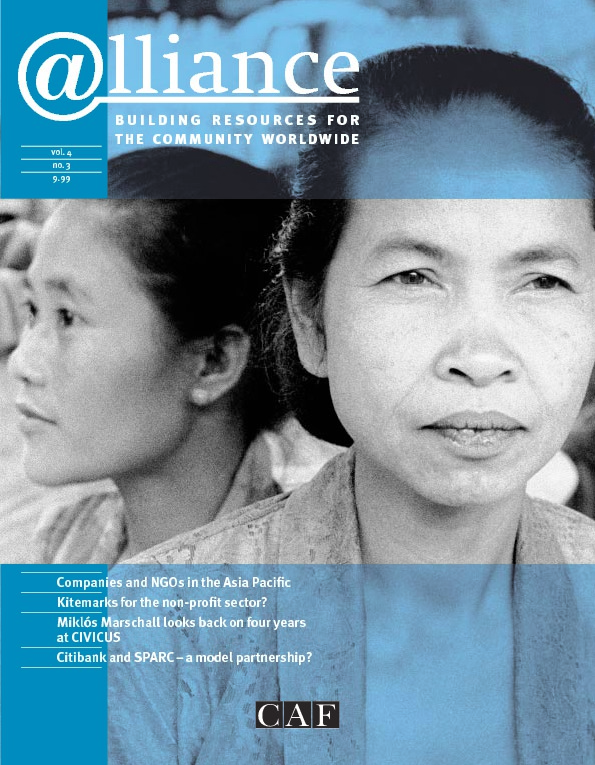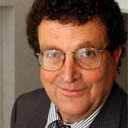Increasingly, NGOs raise money in different countries and remit it to a headquarters organization in another country. But how can people be sure that the headquarters organization will use the money properly? A new system of international accreditation is being established, building on the work of national monitoring bodies over many years.
On-the-spot, worldwide TV satellite reporting now brings horrifying images of disaster, disease and deprivation directly into people’s homes. Strongly affected by these images, people respond generously to appeals from charities/NGOs to help the victims. But most developed countries have hundreds of national NGOs seeking funds for national and global good causes. Generous though the public can be, NGOs are increasingly having to compete for funds and to find new ways of raising money.
The larger NGOs have reacted in two ways. First, they are adopting more sophisticated fundraising methods. TV ‘spectaculars’ are used very successfully by some NGOs. Audiences of millions can be achieved by using popular presenters and personalities to host the shows. Electronic cash transfer facilities make it easy and cheap to collect donations.
But some more enterprising NGOs have gone further and transformed themselves into global enterprises. These NGOs have become multinational not-for-profit organizations in their own right and raise funds in dozens of different countries. Most of these, such as OXFAM and Save the Children, started from a national base but have become true international organizations.
Government regulation
Governments tend to favour NGOs and charitable activity. Many offer inducements to donors to encourage giving, such as tax relief on donations. To maintain public confidence in NGOs, which is essential to sustain the flow of donations, governments are concerned that benefits should go only to bona fide organizations. Fundraising in most developed countries is therefore subject to some form of legal supervision. Often it is the tax authorities that have set up schemes to register NGOs in order to control how and where concessions are given.
However, most governments have not thought it necessary to monitor or control more explicitly how NGOs operate, and most rely on the general legal provisions that govern the operation of commercial organizations to protect the public. Interestingly, few countries have any provision to control how overseas organizations may operate within their national boundaries, particularly where charitable fundraising in concerned.
National monitoring agencies
Public confidence in NGOs is central to the success of charitable fundraising. Fundraising can be seriously damaged when some of the scams that regrettably are perpetrated on the public are exposed in the media. To help maintain public confidence and to reduce the danger of people being taken in by fraudulent appeals, private or semi-official monitoring bodies have been set up in a number of countries. Currently there are such agencies in seven European countries, one in Canada, and at least three in the US. Some of these have government support, and recognition from them can give fundraising NGOs valuable rights and benefits, for example licences to hold street collections.
One of the oldest of these bodies, the National Charities Information Bureau (NCIB – see p00) in New York, was founded in 1919 to ensure that funds from charity appeals to help veterans returning from the 1914–18 war actually reached them. The Zentralstelle für Wohlfarhtsunternehmen (ZEWO – Central Bureau of Welfare Organizations) in Switzerland is over 60 years old and the Deutsches Zentralinstitut für soziale Fragen (DZI – Central Institute for Social Affairs) in Germany can trace its foundation back to 1893. In these countries with long-established agencies, the public has come to trust the agency’s judgements and NGOs recognized by them attract more funds.
Different approaches
Each national agency has developed its own standards and requirements to measure NGOs against. These standards have many common features: for example, requirements for financial disclosure and ethical practices in fundraising.
Some agencies, such as ZEWO in Switzerland and the Evangelical Council for Financial Accountability (ECFA) in Washington DC, award a distinctive seal of approval that registered NGOs can display in their publicity material. This provides a valuable signal to the public that the charity has undergone some form of independent assessment and that it has satisfied the agency’s standards for probity and governance.
The NCIB checks detailed financial and governance information obtained from the NGO against NCIB’s nine standards and publishes the outcome in its quarterly newsletter and on its website. If an NGO refuses to give NCIB the information – and some do refuse – NCIB notes this in its report and leaves the public to draw their own conclusions.
Some monitoring agencies operate as membership organizations. The French Comité de la Charte accepts NGOs as members if they meet the Comité’s standards and agree to abide by the code of conduct. The ECFA, as the name implies, is concerned with Christian evangelical fundraising NGOs. It is also a membership body, carrying out site inspection visits before accepting an NGO as a member. Currently it has over 800 member NGOs and the ECFA seal of approval is widely recognized in the evangelical community.
An international body
In 1958, long before international fundraising was a significant activity, a small group of monitoring agencies met in The Netherlands and decided to create the International Committee on Fundraising Control (ICFC). The idea was that this would provide a forum for national agencies to meet and share experiences. By 1989 membership had increased and the committee reconstituted itself as the International Committee on Fundraising Organizations (ICFO). In 1999 ICFO has 13 member organizations based in 11 different countries.
Multinational NGOs
ICFO members are usually able to check how their national NGOs spend the money they raise. Even if the money raised is spent overseas, a national NGO will usually have control over the how the funds are spent and the monitoring agency can see how this is done.
However, now that NGOs have started to raise funds in countries other than their own, ICFO members have become concerned about what happens to funds raised in their country but remitted overseas. Typically a multinational charity will establish satellite or daughter organizations in a number of different countries to raise money and the money raised is remitted to a ‘headquarters’ organization. This then distributes the money to relief programmes across the world.
If the headquarters is a well-established organization in another country, an ICFO member may be monitoring it in that country and this will provide accountability for the funds raised. The situation is different if there is no ICFO member organization in the country where the headquarters is based, or it chooses not to seek accreditation. It may not be fundraising in that country and, for legitimate tax reasons, may not even have corporate status. This means that such organizations may not be subject to any oversight from official bodies and are effectively accountable to no one.
International accreditation
In response to this situation, ICFO decided to set up an accreditation process for these international fundraising bodies. Three years ago, it formulated a draft set of standards. These standards have now been tested in a trial accreditation carried out in 1998 in cooperation with a large international charity.
This organization has constituent organizations in many European countries and elsewhere in the world. ICFO carried out an independent assessment of the global support functions, which are based in the UK, and was able to certify that its operations were in compliance with ICFO standards. This certification is valid for two years, after which period there will need to be a re-inspection. The UK-based Mentor Foundation is about to follow suit (see box on p00).
At its 1999 Annual General Meeting in Vienna, ICFO decided to revise its international standards. The current standards are too general and unspecific: statements such as ‘Fundraising should be ethical’ need to be fleshed out if they are to be meaningfully applied. The matter will be considered by the ICFO Board in October this year. ICFO is anxious to consult widely on the revision of the standards and it welcomes comments and suggestions from interested parties. The current standards are available on the ICFO website at http://www.icfo.org
John Beishon is Secretary-General of ICFO and Chief Executive of the UK-based Accrediting Bureau for Fundraising Organizations. He can be contacted on +44 171 608 2597 or at icfo@axford.com
Mentor Foundation pushed into accreditation
The Mentor Foundation (MF) has been established in the UK only since the beginning of March. Its headed notepaper isn’t yet printed. Yet it is seeking accreditation from ICFO. Director Mike Whitlam is not against accreditation in principle but feels it may be premature in this case. So why is he doing it?
Established in Geneva in 1995, and the only international NGO working in the field of substance abuse prevention, the Mentor Foundation has now moved from its pilot stage to ‘phase two’. Legally still a Swiss foundation, it will have ten country offices and an international office in London within three years. The country offices will manage their own programmes, but under the franchise agreement a proportion of funds raised will go to the headquarters office – the Mentor Foundation (MF). While Mentor UK will be a UK registered charity, MF is not at present. It is not registered by the Charity Commission nor supervised by any other body in the UK.
The pressure to be accredited is coming from some of the country offices. Mentor Sweden is recognized by Stiftelsen för Innsamlingskontrol (SFI – Swedish Foundation for Fundraising Control) in Sweden, but it can maintain its accreditation only if MF is accredited by ICFO. The same applies in Germany, where Mentor Germany will need to be recognized by Deutsches Zentralinstitut für soziale Fragen (DZI). In both Sweden and Germany such recognition is crucial to the success of a fundraising body. If MF is not accredited by ICFO, it will thus make it very difficult for these and perhaps other country organizations to operate.
Director Mike Whitlam, who moved from the British Red Cross to set up the Mentor headquarters, has no quarrel with ICFO’s standards: ‘The requirements are not onerous. You shouldn’t be in this business if you can’t meet them.’ In fact he has long been an almost evangelical advocate of good management in the NGO sector. Nor does he deny that ICFO accreditation provides more than Charity Commission (CC) registration: ‘Anyone can register with the CC, they don’t send anyone round to check on the organization unless things go wrong. ICFO sends in two or three people and provides a “kitemark” that shows you’ve been checked out.’
His reluctance to go for accreditation at this stage is pragmatic: it will cost £2,000, and what will MF – now at what he calls the ‘kitchen table stage’ of the life of an organization – get out of the process? From the point of view of MF itself (as opposed to the country offices), it simply isn’t a priority. However, he hopes that the process will ensure that the best systems are in place from the beginning.
For further information about MF contact Mike Whitlam on +44 171 291 6141 or at whitlam@mentorfoundation.org
ICFO members
ABFO — Accrediting Bureau for Fundraising Organisations, UK
http://www.axford.com/abc
CCCC — Canadian Council of Christian Charities, Canada
http://www.cccc.org/
CBF — Centraal Bureau Fondsenwerving, The Netherlands
+31 20 417 0003
CAF — Charities Aid Foundation, UK
http://www.CAFonline.org
Comité de la Charte, France
+33 1 53 36 35 00 ccharte@compuserve.com
DZI — Deutsches Zentralinstitut fur Soziale Fragen, Germany
http://www.dzi.de
ECFA — Evangelical Council for Financial Accountability, USA
http://www.ecfa.org
Givewell — Australia
http://www.givewell.com.au
NCIB — National Charity Information Bureau, USA
http://www.give.org
OFSE — Osterreichische Forschungsstiftung fur Entwicklungshilfe, Austria
http://www.oefse.at
SFI — Stiftelsen For Innsamlingskontrol, Sweden
+46 8 308 646
Stiftelsen Innsamlingskontrollen I Norge, Norway
+47 22 41 31 90 Jacob.Berger@deloitte.no
ZEWO — Zentralstelle fur Wohlfartsunternehmen, Switzerland
+41 1 363 50 90



Comments (0)